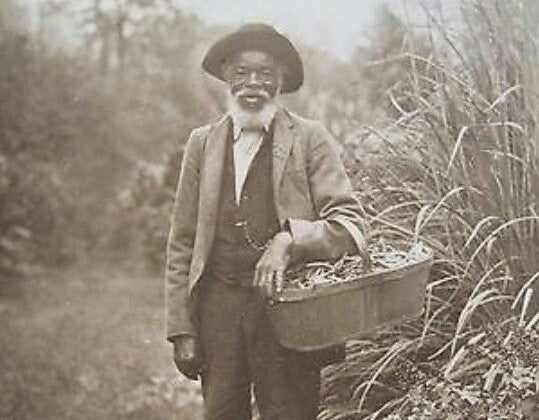African American herbalists were often the primary healthcare providers in their communities and drew on the medical knowledge of Africa, Europe, and the Americas. But despite their expertise, few African American herbalists were recognized or appreciated by Anglo colonists. Doctor Caesar is one of the exceptions – a talented Black herbalist from the 1700s who is widely credited as being the first African American to have his medical observations published.
Go to comment (1)

A Black man gathering roots. This is not a photo of Doctor Caesar, who lived long before the camera was invented.
Each February we take some time to delve into the rich but often ignored history of African American herbalism. Our own products draw primarily on Asian herbal traditions rather than Western or Southern, so we’re less familiar with the history of African, European and American herbalism – which makes diving into Black herbal traditions a fascinating journey.
This month we came across the unique story of Doctor Caesar, an enslaved man who was “owned” by one Mr. John Norman of South Carolina in the 1700s. Doctor Caesar became well-known for his knowledge of medicinal plants and especially for his antidotes to poison; so much so that he eventually came to the attention of the South Carolina legislature.
Southern slaveowners at the time were quite paranoid about being poisoned by the enslaved men and women who worked in their households, so any information about remedies for poison was of intense interest to them. Realizing this, Doctor Caesar seized the opportunity to negotiate on his own behalf, offering to reveal his secret remedies to the legislature in exchange for a “reasonable reward.”
The South Carolina Commons House of Assembly (the lower house of the legislature) appointed a committee to investigate the Doctor’s claimed cures. They heard testimony from prominent witnesses who had personally witnessed his cures work for themselves and their families, quickly relieving the symptoms of suspected poisoning. They also heard from Mr. Norman who stated that the doctor had “done many services in a physical way, and in particular had frequently cured the bite of rattle snakes, and [Norman] never knew him to fail in any one attempt.” He stated the Doctor often ministered to the neighbors and also mentioned instances of the Doctor curing bacterial infections and pleurisy (inflammation of the lining of the lungs and chest cavity).
The committee was persuaded that Doctor Caesar’s antidotes were legitimate and called him to appear before them. They asked him his terms to reveal the remedies and the Doctor replied that “he expected his freedom” as well as a sum of £100 annually for the rest of his life. At the committee’s recommendation, the South Carolina Commons House of Assembly voted to take him up on his offer, as well as to pay Mr. Norman the “appraised value” of “his Negro” which was eventually set at £500. The upper house of the legislature was, somewhat reluctantly, persuaded to go along with this plan.
In exchange, Doctor Caesar provided the recipes for his poison antidotes and they were published in the South Carolina Gazette in 1750 and reprinted in 1751. They were also taken up and widely reprinted across North America and Britain for several decades. For this reason, Doctor Caesar is often considered the first African American to have his medical observations published in print.
Doctor Caesar’s antidotes rely on two of the great Old World healing herbs which were brought to the New World by colonists and are now widely naturalized here: English plantain (Plantago lanceolata) and horehound (Marrubium vulgare). English plantain is known to have a wide variety of benefits including as an antimicrobial, anti-inflammatory, laxative, diuretic and more. And white horehound is used for lung complaints such as coughs, asthma, and bronchitis; it’s also known as a hepatic (liver) stimulant and protectant, which could be why Doctor Caesar found it useful in poisonings.


Marrubium vulgare and Plantago lanceolata
Here are the remedies as described by Doctor Caesar:
While many modern readers may view these remedies with skepticism, those of us who regularly use medicinal plants know how powerful they can be. In any case, we’re happy to have both Plantago lanceolata and Marrubium vulgare growing here on the Plantiva property!
We look back on the life and work of Doctor Caesar with admiration. He clearly possessed a deep knowledge of the botanical world along with the benevolence to use it for the good of those around him. He also had the acumen to seize on a life-changing opportunity when it presented itself. Unfortunately, he lived only a few years after manumission and his estate was not large enough to purchase the freedom of his family. Nevertheless, he made his mark on history at a time when few Black men were able to do so.
References and Further Reading:
https://www.ccpl.org/charleston-time-machine/doctor-caesar-and-his-antidote-poison-1750
https://www.scencyclopedia.org/sce/entries/caesar/
https://www.ahpa.org/herbs_in_history_marrubium
https://thenaturopathicherbalist.com/herbs/p-q/plantago-lanceolata/
https://thenaturopathicherbalist.com/2015/09/06/marrubium-vulgare/


Doctor Caesar: A Remarkable Black Herbalist of the 1700s
Comment (1)
Awesome article!